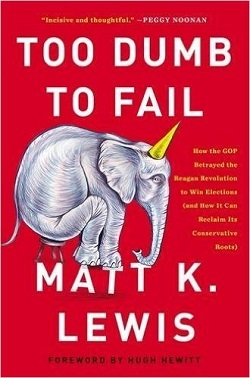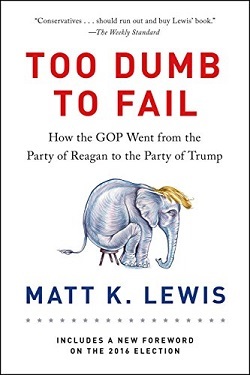This is not a particularly entertaining book, although it’s extremely well written. You’re going to be taken through a lot of history, and you’re going to have to think. There’s no ranting and raving. Unfortunately, the R&R crowd on the right is much easier to absorb. All you have to do is nod vigorously and perhaps do a few fist pumps, and there you are. But it’s the knee-jerking and first-pumping that has landed the conservative movement in the mess we are currently hip-deep in. The audiobook has an updated forward that addresses the Donald Trump phenomenon, but the body of the work came out in January 2016. Lewis correctly predicted his rise, however. As I sit and write this review, the week before Labor Day, it doesn’t seem too likely that there will be a President Trump, but most thoughtful people never thought there would be a Nominee Trump. So who knows. Whoever wins the election, Lewis’s book will be a helpful way forward. Let me start by quoting a great couple of lines from his opening:
In short, I essentially have two enemies: heretics and lunatics. Heretics are those people who think the only way conservatives can win is by becoming more liberal. Lunatics are those people who are hoarding Confederate flags and worried about black helicopters. This book rejects both extreme ends of that spectrum.
(I’m having to reign myself in as I look back through the book to prepare this post, because it’s so tempting to just quote everything Lewis says.)
Lewis self-identifies as a Reagan admirer, a conservative, and a pro-life Evangelical. There are several sections in his book where he makes his understanding clear of what it truly means to be a Christian. He is no posturer. If the conservative movement, the Republican party, conservative Christians, whatever groups you see as on the right of the political spectrum, are to have any credibility and any real impact on our society, we have to understand what conservatism really is, first of all, and then how to bring it into the public square. And Americans on the political left will, I think, still find much to affirm in this book. The politics of America should be based on a fair fight between respected and respectful opponents. (I know, I know—pretty idealistic.) We have fallen far down the chute from the days when William F. Buckley Jr. hosted “Firing Line” and brought in a wide assortment of guests, from all sides of issues, to actually discuss and debate ideas instead of screaming at each other. (My dear father was a great Buckley fan, and I remember watching the show with him. It debuted in 1966, when I was 14. I would get very tickled at Buckley’s drawling voice and big words, although I’d have to say that my understanding of what he was actually talking about was pretty minimal.)
So the first question that has to be answered is: What is a conservative? We tend to think of “the conservative movement” as being a set of concepts: small government, strong defense, self-reliance, and respect for the family and for life itself, including the life of the unborn,to name the most obvious. But, as Lewis points out, these concepts are actually what he calls “downstream ideas.” They flow, in other words, from a deeper source, which is a true understanding of the nature of mankind. Sounds pretty uppity-up for a political philosophy, doesn’t it? But how you run your government is a reflection of how you view the people you govern. Are there inherent moral truths, or is everything up for grabs? Is the family, for instance, simply a construct that man came up with somewhere along the evolutionary way, or is it innate in the nature of humankind? Indeed, is there such a thing as “the nature of humankind,” or can we be changed at will? Lewis answers this question not by quoting the Bible (although of course he could have done so) but by referencing the ancient Greek philosopher Aristotle. Oh dear. Here’s another quotation. I just can’t say it any better than he can:
Aristotle’s foundational conservative truths speak to the very ideas on which humanity rests—and on which nations rise and fall. If you absorb his worldview, you will usually arrive at conservative politics. But get his fundamental ideas wrong, and the consequences can be dire.
I would add, and Lewis would agree, that part of this fundamental understanding of mankind is that we are sinful. Any societal reforms are always going to be limited by that sad fact, and any programs that do not take that fact into account are doomed.
Okay. So Lewis goes from Aristotle to Edmund Burke to Ronald Reagan and then to the mess we’s in today. It’s all very informative and challenging, and thought-provoking. I’m going to end this post with the way he begins his conclusion, and if you don’t get anything else from this post or indeed from the book itself, please get this:
One last piece of advice for everyone—candidates, strategists, think tankers, and individuals alike—subject yourself to opposing viewpoints. Doing so poses risks if you’re not firmly rooted in your core beliefs, but I’ve found that necessity is the mother of invention. The more I have appeared on liberal interview shows, the more I have fleshed out why my conservative beliefs actually are best for America. By attempting to understand the other side, I have become more knowledgeable and better able to communicate my conservatism.
In other words, come out of the echo chamber, America! Maybe you’ll find that you actually like the free exchange of ideas and the chance to preach to someone other than the choir.


